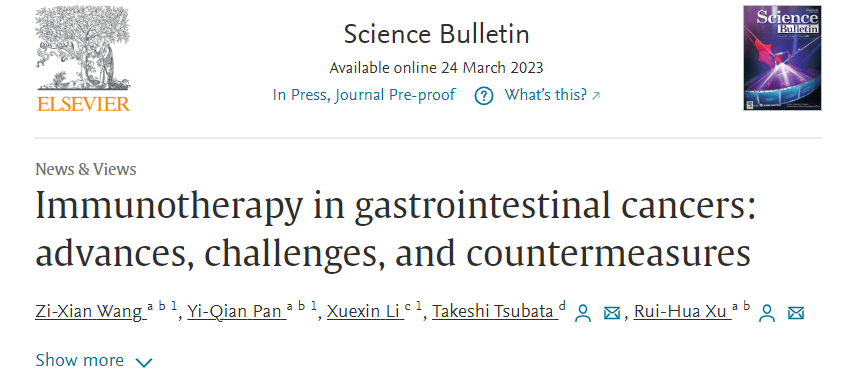The morbidity and mortality of intestinal tumors are among the top malignant tumors, and they are major diseases that seriously threaten people’s health. The prognosis for some patients with gastrointestinal malignancies has significantly improved thanks to recent developments in immunotherapy using PD-1/PD-L1 immune checkpoint inhibitors (ICIs).
Recently, Professor Xu Ruihua from the Center for Cancer Control of Sun Yat-sen University and Professor Takeshi Tsubata from Tokyo Medical and Dental University published a paper in Science Bulletin entitled “Immunotherapy in gastrointestinal cancers: advances, challenges, and countermeasures”, systematically reviewed the progress of immunotherapy in gastrointestinal cancers, and highlighted the challenges to be overcome and important directions for future development in this field.
The article points out that although several phase 3 clinical studies in recent years have demonstrated the efficacy of PD-1 antibodies in the third-line treatment of advanced gastric cancer and second-line treatment of advanced esophageal cancer, their efficiency is only about 15%. In advanced colorectal cancer, patients with high microsatellite instability (MSI-H) or deficient mismatch repair (dMMR) benefit significantly from PD-1/PD-L1 antibody monotherapy. However, in the microsatellite instability stable (MSS)/proficient mismatch repair (pMMR) patients, who account for approximately 95% of the patients, the efficacy rate is only 0–2%. In order to improve the efficacy of immunotherapy in gastrointestinal tumors, it is necessary to accurately screen the beneficiaries of anti-PD-1/PD-L1 therapy through biomarker studies on the one hand, and to develop more effective combination therapy strategies to overcome immunotherapy resistance on the other hand.
Biomarker studies have shown that immunogenicity-related biomarkers, such as the number of mutations in the tumor and the POLE/POLD1 mutation, can predict how well anti-PD-1/PD-L1 monotherapy will work in advanced gastrointestinal tumors. There are tumor species differences in the predictive efficacy of traditional biomarker—PD-L1 expression levels: advanced esophageal and gastric cancers with high PD-L1 expression showed higher response rates to PD-1/PD-L1 antibodies, while no such trend was observed in MSS/pMMR-type advanced colorectal cancers. In recent years, immune microenvironment resolution and typing of gastrointestinal tumors based on histological data have also been developed. However, most of the existing biomarker studies are based on retrospective analysis of single-arm and small samples, and more biomarker-oriented prospective studies are still needed to confirm their clinical application in the future. At the same time, biomarkers for screening pseudo-progression and hyper-progression of ICIs, guiding the time frame of ICIs use and timing of reintroduction/re-challenge, and predicting the risk of immune-related adverse reactions also need to be further developed. With the continuous development of ctDNA, molecular imaging, and other emerging technologies in the future, these problems are expected to be solved.
In the exploration of combination therapy, the model of PD-1/PD-L1 antibody combined with existing standard therapy (e.g., chemotherapy, targeted therapy) has achieved a series of successes in the first-line treatment of advanced esophageal cancer and gastric cancer, but there are also failure cases such as the KEYNOTE-062 study. The efficacy of PD-1/PD-L1 antibodies in combination with standard chemotherapy and targeted therapy in anti-PD-1/PD-L1 treatment for primary resistant MSS/pMMR type advanced colorectal cancer remains uncertain. From the perspective of activating anti-tumor immunity, the optimal chemotherapy regimen and dose to be paired with immunotherapy remain to be elucidated. In addition, some chemotherapeutic agents with immune activation effects other than standard chemotherapy regimens (e.g., temozolomide) have shown potential for gaining anti-PD-1 therapy in MSS/pMMR type advanced colorectal cancer, which deserves further exploration in the future.
The combination of PD-1/PD-L1 antibodies with other ICIs or drugs targeting microenvironmental inhibitory factors (e.g., VEGF, MEK, TGFβ, and other signals) has also been extensively explored in advanced gastrointestinal tumors, but the reported efficiency rates are mostly below 20%. In the face of this dilemma, we should think beyond exhaustive drug combinations and aim to identify key drivers of primary resistance to immunotherapy for a given subgroup of patients and develop targeted intervention strategies. One example is that in a recent phase 2 study in advanced gastric cancer, the combination of an inhibitor of the immune escape target DKK1 (DKN-01) with a PD-1 antibody and first-line chemotherapy achieved up to 90% efficiency in patients with high DKK1 expression. In addition, considering that gastrointestinal tumors may be aberrantly regulated in multiple components of the antitumor immune response, the combination of PD-1/PD-L1 antibodies with drugs that act on multiple components of the antitumor immune response (e.g., PD-1 antibodies in combination with VEGF inhibitors and histone deacetylase inhibitors) is also in the clinical exploration stage. In addition to ICIs, immunotherapies such as CAR-T, tumor vaccines, and emerging therapies such as gut flora immunomodulators and antibody-drug conjugates are being explored in combination with anti-PD-1/PD-L1.
Immunotherapy also brings new treatment options for resectable early/intermediate gastrointestinal tumors, and several phase 2/3 clinical studies exploring neoadjuvant/adjuvant immune (combination) therapy are underway. Based on the available evidence, the introduction of immunotherapy is expected to optimize the existing neoadjuvant/adjuvant regimens and further improve the cure rate; on the other hand, it is expected to overturn the traditional treatment paradigm of early/mid-stage gastrointestinal tumors centered on surgery and enable non-surgical cure and organ preservation in some patient subgroups (e.g., dMMR type II/III rectal cancer). More phase 3 clinical studies and long-term follow-up data are needed to add new evidence in this area.
At present, we have only uncovered the tip of the iceberg of immunotherapy for gastrointestinal tumors. We believe that through the joint efforts of the international scientific community, our understanding of the immune escape mechanism of gastrointestinal tumors will continue to improve, leading to the development of more accurate and effective immunotherapy strategies that will benefit more patients.
Reference
1. Wang, Zi-Xian, et al. “Immunotherapy in gastrointestinal cancers: advances, challenges, and countermeasures.” Science bulletin 68.8 (2023): 763-766.

